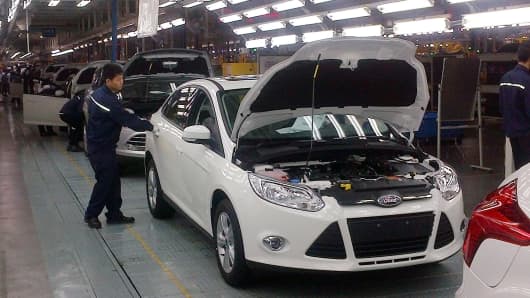
Hauke-Christian Dittrich | picture alliance | Getty Images
At Ford's stand at the IAA Commercial Vehicles, an off-road vehicle of the Ford Ranger type is on a Ford Transit van.
Ford reported fourth-quarter earnings that fell short of what investors expected, laying the blame for its lackluster performance on restructuring costs and troubled markets overseas.
Ford's difficulties in Europe, China and South America have been no secret, and executives devoted a fair amount of time on a their earnings call Wednesday explaining the company's weaknesses and what they're doing to address them.
"Ford entered 2019 with a very clear vision and we're building momentum to improve profitability and returns," said CEO Jim Hackett on a conference call on Wednesday. "We're now in execution mode."
Its shares rose by more than 3 percent in intraday trading Thursday.
Here are the top five things executives said Ford is doing to turnaround its international sales.
New products

Source: Ford
The Ford Territory, a mid-sized SUV Ford unveiled in China
Ford is revamping its lineups all over the world, focusing on selling only its most profitable models. In the United States, this mostly means pickup trucks and sport utility vehicles. In Europe, this includes pushing the Ranger, its mid-size pickup, and offering higher-performance sports packages for the Fiesta subcompact car and Focus compact car overseas.
Perhaps the biggest push is in China, which is the largest auto market in the world and a sore spot for Ford. Chinese automakers already offer consumers there a lot of options, forcing importers to constantly refresh their lineups or get left behind like Ford.
"China is the largest automotive market in the world and we think it could be twice the size of the U.S. by 2025. So getting our business back on track is essential," Ford Executive Vice President of Global Markets Jim Farley told investors. "Last year as we discussed you with you, we identified a number of operating shortfalls," he said, citing dealership profitability, excess inventory and a lack of a fresh lineup of new vehicles as major deficiencies in China.
Last year, the company unveiled a sport utility vehicle that is meant to kick off a slew of new products for the country. This includes a new version of the Escape compact SUV, and Focus. Both vehicles saw transaction prices double in China in 2018. Ford has ten more models on the way, Farley said.
Dealer profitability

Qilai Shen | Bloomberg | Getty Images
A Ford Escort on display at a Ford dealership in Shanghai, China, on Thursday, July 19, 2018.
Keeping dealerships profitable has been a big problem for Ford, particularly in China. The company has taken some steps to address this, and about one third of its dealers in China are now profitable. The company expects the trend to continue upward through the year, Farley said.
Local production

Meghan Reeder | CNBC
Cars roll down the assembly line at the Ford plant in Chongqing, China.
Automakers typically build where they sell, but sometimes import and export vehicles from one country to another. The ongoing trade war has not been kind to the business, primarily driving up the cost of materials. Tariffs alone cost Ford $750 million in 2018.
Ford said it can make money-losing cars more profitable just by focusing more of the supply chain and assembly near the market they're destined for sale.
"Simply by sourcing from a true local Chinese supply base, we will cut our material costs and we are targeting significant reductions in structural costs for consolidated operations," Farley said.
Ford said Wednesday it needs to "localize" some key imports into China, specifically the Ford Explorer and some Lincoln vehicles, which tend to command high prices and yield profits for the brand.
"The effect of that is pretty amazing when you look at each of the Lincoln products and the Explorer in terms of going from what now are quite substantial losses for those imports to very attractive mostly business cases," Farley said.
Cutting losses

Oliver Berg | picture alliance | Getty Images
Ford employees assemble the StreetScooter Work XL in North Rhine-Westphalia, Cologne. For the first time, Deutsche Post DHL is not building the street scooter itself, but in cooperation with carmaker Ford.
Unlike rival General Motors, which determined its European business wasn't worth keeping, Ford's problem is that many of its international operations are a mixture of good and bad, said Jeffries analyst Philippe Houchois. It's especially an issue in Europe where it recently announced job cuts and a new partnership with German automaker Volkswagen.
More details about how the two automakers intend to work together need to be revealed, but many industry analysts think collaborating with VW will allow Ford to keep a foothold in Europe, where it currently has successful commercial transit van and pickup truck businesses that has grown in market share for the last five years.
More restructuring

Paulo Fridman | Corbis News | Getty Images
Assembly line of engines for the Ford KA 1.0 3 cylinders at the Ford Engines plant in Camaçari, Brazil.
Ford's $11 billion restructuring plans, which Hackett had largely kept a mystery from investors, are beginning to take shape. He told investors "more details" will be coming on its plans to overhaul its business in South America, where Ford, and many automakers, have historically had uneven performance.